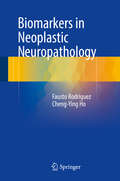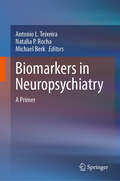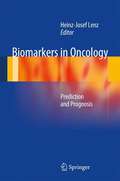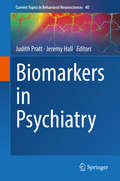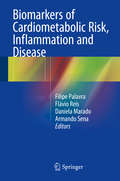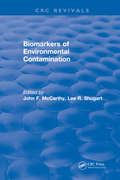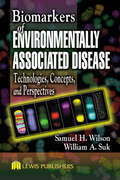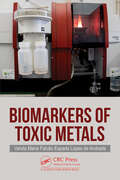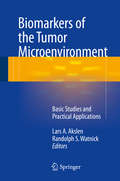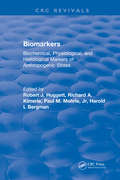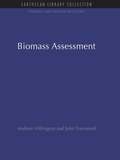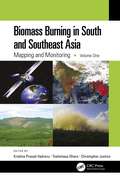- Table View
- List View
Biomarkers in Liver Disease (Biomarkers in Disease: Methods, Discoveries and Applications)
by Victor R. Preedy Vinood B. PatelThere are numerous types of liver disease that may be due to toxic agents (such as alcohol or drugs), infectious agents including viruses, congenital conditions and even poor dietary patterns. It has been suggested that there are over 100 different types. As the consequences of liver failure can be devastating it is important that appropriate diagnosis and monitoring is carried out. Much of this characterisation entails the use of biological indicators, i. e biomarkers. Biomarkers in Liver Disease embraces a holistic approach by combining detailed information on different conditions that affect the liver and the use of biomarkers. Biomarkers are described in terms of conventional, new and emerging analytes, techniques, platforms and applications. It covers the latest knowledge, trends and innovations. New platforms are described which combine advances in biomedical sciences, physics, computing and chemistry.
Biomarkers in Neoplastic Neuropathology
by Fausto Rodriguez Cheng-Ying HoThis book is a rich source of information on biomarkers applicable to the pathology of neoplastic disorders of the brain. Thorough descriptions are provided of the techniques currently available for clinical and experimental evaluation of biomarkers in brain neoplasms, including in situ hybridization, array-based methods, methylation profiling, next-generation sequencing, and practical gene panels. Incorporation of multiple biomarkers in the development of molecular subgroups with biologic and therapeutic relevance is also discussed. A section on biobanking covers the equally important topic of optimal preservation of tissue and includes consideration of ethical considerations raised by the use of tissue obtained in clinical settings. The closing section discusses the major categories of neoplastic disorders involving the nervous system, with emphasis on diagnostic, prognostic, and predictive biomarkers used in the pathologic evaluation of different types of brain tumor.
Biomarkers in Neuropsychiatry: A Primer
by Michael Berk Antonio L. Teixeira Natalia P. RochaThis book presents the ‘state of the art’ of biomarkers research in neuropsychiatric conditions, from dementia to eating disorders, as well as providing methodological, practical and ethical issues related to the development of biomarkers. Biomarkers have revolutionized clinical research and practice in most fields of medicine, but psychiatry has lagged behind. However, in the last decade, there has been a growing expectation that biomarkers will advance and, ultimately, reframe psychiatry research and practice. Biomarkers might inform about diagnosis, therapeutics, prognosis, contributing to a ‘personalized medicine’. Understanding their meaning, possibilities and limitations will help clinicians, researchers and students in the related areas navigate and excel in the challenging and ever changing field of neuropsychiatric disorders.
Biomarkers in Nutrition (Biomarkers in Disease: Methods, Discoveries and Applications)
by Victor R. Preedy Vinood B. PatelThis handbook provides an all-inclusive insight into biomarkers assessing the impact of nutrition on human health. The reader will gain insight into the area of circulating body fluid biomarkers, from cardiovascular related markers to liver functional tests. Various biomarkers related to the intake of micronutrient and macronutrients are presented, and the effects of different diets, pesticide exposure and dietary supplements are discussed, so are changes of genetic, cellular and histological variables.This systematic handbook is a must have for biomedical researchers as well as clinicians and pharmacologists, who wish to gain extensive understanding on the analysis of effects of various nutritional and dietary effects on human health, ageing and longevity.
Biomarkers in Oncology
by Heinz-Josef LenzThis integrated book covers the entire spectrum of cancer biomarkers in development and clinical use. Predictive and prognostic markers are explored in the context of colon cancer, breast cancer, lung cancer, prostate cancer, and GIST. International experts provide insight into toxicity markers and surrogate markers. Attention is also given to biomarker assay development, validation, and strategies. A powerful tool for determining decisions on therapy, selecting drug regimens, monitoring the efficacy of treatment, and performing individualized surveillance, biomarkers represent the forefront of cancer research and treatment. As these technologies become increasingly available for clinical use, this book will be an essential resource for oncologists and translational researchers.
Biomarkers in Periodontal Health and Disease: Rationale, Benefits, and Future Directions
by Nurcan BuduneliThis book examines all aspects of the progress being made towards the development of highly specific and sensitive biomarkers that will overcome the shortcomings of clinical assessments in periodontics. The opening chapters present the basic anatomic features of periodontal tissues, outline the nature and pathogenic mechanisms of periodontal diseases, and discuss both conventional and novel methods of diagnosis with reference to their specificity and sensitivity. The potential role of biomarkers in periodontal diagnosis is then presented in the light of the published data. The biological samples in which potential biomarkers are sought are evaluated comparatively, drawing attention to their strengths and weaknesses, and the available technologies for biomarker studies are reviewed. The potential benefits of biomarkers are also discussed with regard to the possible bidirectional interactions between periodontal diseases and systemic health. Finally, the past, present, and future of periodontics are examined from a broader perspective. Readers will find the book to be an ideal summary of the state of the art in the field as biomarkers emerge that promise to facilitate periodontal diagnostics and permit timely, personally tailored interventions.
Biomarkers in Psychiatry (Current Topics in Behavioral Neurosciences #40)
by Judith Pratt Jeremy HallThis volume addresses one of the Holy Grails in Psychiatry, namely the evidence for and potential to adopt ‘Biomarkers’ for prevention, diagnosis, and treatment responses in mental health conditions. It meshes together state of the art research from international renowned pre-clinical and clinical scientists to illustrate how the fields of anxiety disorders, depression, psychotic disorders, and autism spectrum disorder have advanced in recent years.
Biomarkers in Toxicology (Biomarkers in Disease: Methods, Discoveries and Applications)
by Victor R. Preedy Vinood B. Patel Rajkumar RajendramThis handbook of the series Biomarkers in Disease informs comprehensively about all aspects of monitoring and detecting toxicity in the human body and model organisms. Biomarkers for assessing toxicity in diverse organs are presented and different assays and methods are explained. Single compounds and drugs and their toxicity for humans are shown and the methods for detection described. Similar to all the volumes of the Biomarkers in Disease series, the chapters are written by experts in their field, each chapter features key facts summarizing the most important aspects of its respective topic and the definitions of words and terms facilitate the reading and understanding. This handbook is a must-have for researchers in toxicology and biomedicine who analyze the effects of drugs and various other substances in the human body and in model organisms. It also serves as a thorough guide for clinicians and pharmacologists.
Biomarkers in Trauma, Injury and Critical Care (Biomarkers in Disease: Methods, Discoveries and Applications)
by Victor R. Preedy Vinood B. Patel Rajkumar RajendramThis handbook systematically presents biomarkers for traumatic injuries. The book covers topics such as traumatic brain injury, liver injury, burn severity, muscle heart damage, and acute inflammation in polytrauma and their detection by biomarkers.Biomarkers and methods used in critical care and critically ill patients are discussed, as well as biomarkers in trauma and special conditions. Specific biomarker components are explained and models for modeling trauma in research are presented.This systematic handbook is an excellent resource for researchers and specialists in trauma research and treatment, as well as clinicians and physicians who want a thorough overview of various injuries, trauma, and their detection methods.
Biomarkers of Cardiometabolic Risk, Inflammation and Disease
by Filipe Palavra Flávio Reis Daniela Marado Armando SenaThis book discusses recent advances in the area of cardiometabolic risk biomarkers of chronic inflammatory and cardiovascular disorders. Tackling the topic in a systematic manner, the book starts with an introduction to cardiometabolic risk and its clinical relevance, comparing emergent and classical biomarkers. It then goes on to discuss cardiometabolic risk biomarkers in a range of diseases, including diabetes, ischemic stroke and neurodegenerative disorders. Biomarkers of Cardiometabolic Risk, Inflammation and Disease is aimed at doctors specializing in internal medicine, neurology, cardiology, rheumatology, nephrology or endocrinology and will also be of interest to GPs, trainee doctors and clinical and basic researchers working on cardiovascular and autoimmune disorders.
Biomarkers of Environmental Contamination
by 0 McCarthyHow can biological markers help assess and predict human health risks? Find out the answers to this question and others in this timely new book examining the use of biological markers in animals and plants for evaluating the ecological and health effects of environmental contamination. The book explains the concept of environmental sentinels, presents example of field studies and discusses the utility of biomarkers within a risk analysis paradigm. Anyone who needs to know how to assess and predict environmental contamination should consider this book essential reading.
Biomarkers of Environmentally Associated Disease: Technologies, Concepts, and Perspectives
by William A. Suk Samuel H. WilsonThe end of the 20th century brought with it a revolution in molecular biology that culminated in advances such as the completion of the human genome. This has brought optimism to the fields of toxicology and environmental health, and the anticipation that molecular biomarkers might soon come of age and have a major impact on human and environmental
Biomarkers of Human Aging (Healthy Ageing and Longevity #10)
by Alexey MoskalevThis book collects and reviews, for the first time, a wide range of advances in the area of human aging biomarkers. This accumulated data allows researchers to assess the rate of aging processes in various organs and systems, and to individually monitor the effectiveness of therapies intended to slow aging. In an introductory chapter, the editor defines biomarkers of aging as molecular, cellular and physiological parameters that demonstrate reproducible changes - quantitative or qualitative - with age. The introduction recounts a study which aimed to create a universal model of biological age, whose most predictive parameters were albumin and alkaline phosphatase (indication liver function), glucose (metabolic syndrome), erythrocytes (respiratory function) and urea (renal function). The book goes on to describe DNA methylation, known as the “epigenetic clock,” as currently the most comprehensive predictor of total mortality. It is also useful for predicting mortality from cancer and cardiovascular diseases, and for analyzing the effects of lifestyle factors including diet, exercise, and education. Individual contributions draw additional insight from research on genetics and epigenetic aging markers, and immunosenescence and inflammaging markers. A concluding chapter outlines the challenge of integrating of biological and clinical markers of aging. Biomarkers of Human Aging is written for professionals and practitioners engaged in the study of aging, and will be useful to both advanced students and researchers.
Biomarkers of Oxidative Stress: Basics and Measurement of Oxidative Stress
by Ralf Henkel Silvana Andreescu Abderrezak KhelfiThis book pinpoints one of the fastest growing, complex subjects in chemistry and medical science: the dangers of oxidative stress to human beings. It provides a solid background on the chemistry behind the generation of reactive species as well as how reactive species are involved in essential physiological processes and in almost every human disease. It also covers the most recent developments in the study of oxidative and reductive stress (redox stress), including the role of radical and reactive species, novel antioxidant therapies, and methods for assessing free radicals and redox stress. The chapters present concise, yet thorough, summaries of the state-of-the-art methods and techniques that any investigator working in the oxidative/reductive stress field needs to access. The current methodologies including the development of sensors and biosensors for the detection of ROS/RNS/RHS and of biomarkers of redox stress are thoroughly discussed. This book is a useful resource for all researchers and students interested in oxidative stress, molecular biology, and chemistry. Physicians and healthcare professionals interested in understanding the molecular mechanisms underlying the redox stress-related diseases also stand to benefit from this book.
Biomarkers of Oxidative Stress: Clinical Aspects of Oxidative Stress
by Ralf Henkel Silvana Andreescu Abderrezak KhelfiThis book pinpoints one of the fastest growing, complex subjects in chemistry and medical science: the dangers of oxidative stress to human beings. It provides a solid background on the chemistry behind the generation of reactive species as well as how reactive species are involved in essential physiological processes and in almost every human disease. It also covers the most recent developments in the study of oxidative and reductive stress (redox stress), including the role of radical and reactive species, novel antioxidant therapies, and methods for assessing free radicals and redox stress. The chapters present concise, yet thorough, summaries of the state-of-the-art methods and techniques that any investigator working in the oxidative/reductive stress field needs to access. The current methodologies including the development of sensors and biosensors for the detection of ROS/RNS/RHS and of biomarkers of redox stress are thoroughly discussed. This book is a useful resource for all researchers and students interested in oxidative stress, molecular biology, and chemistry. Physicians and healthcare professionals interested in understanding the molecular mechanisms underlying the redox stress-related diseases also stand to benefit from this book.
Biomarkers of Radiation in the Environment: Robust Tools for Risk Assessment (NATO Science for Peace and Security Series A: Chemistry and Biology)
by Gayle E. Woloschak Michael D. Wood Carmel E. Mothersill Gohar Tsakanova Tom CresswellThis proceedings volume results from the NATO Advanced Research Workshop on 'Biomarkers of Radiation in the Environment: Robust Tools for Risk Assessment (BRITE)’. The BRITE workshop discussed insights from cancer research, epigenetics, non-human and human risk assessment, since many of the state-of-the-art biomarkers being developed for humans deserve consideration for environmental applications and vice versa. Sessions were very wide-ranging covering methods, mechanisms, cross disciplinary application and regulation.The chapters in this book have been grouped into five major themes that were covered by the BRITE workshop:· Techniques for biomarker development· Low-dose effect mechanisms· Biomarkers for risk evaluation· Biomarkers in wildlife· Biomarker use and responses Each chapter has been written independently and reflects the views of the chapter author(s). Therefore, the readers can form their own balanced view of the different perspectives on biomarkers of radiation in the environment. Given the breadth of topics covered and the state-of-the-art perspectives shared by leading experts in their respective fields, this book should form a valuable resource for anyone with an interest in how biomarkers can be used to improve our understanding of radiation in the environment and its potential impacts.
Biomarkers of Toxic Metals
by Vanda Maria Lopes de AndradeThe current exposure of human populations to toxic metals makes the prevention and control of such exposures crucial. Biomarkers are undoubtably recognized as vital tools to achieve these goals. This book is for researchers, toxicologists, physicians, pharmacologists and those working in governmental regulatory agencies and other public health fields. The first part of this book covers general aspects of biomarkers of toxic metals, while parts 2 and 3 cover biomarkers of xenobiotic metals and essential metals with potential for toxicity, respectively. In part 4, novel approaches to metal biomarkers are focused.
Biomarkers of the Tumor Microenvironment
by Lars A. Akslen Randolph S. WatnickThis book reviews different aspects of the cancer microenvironment, and its regulation and importance for tumor progression. Methodological advancements and practical applications, in terms of how biomarkers are studied and increasingly included in clinical trials and therapy protocols, are described and discussed. Biomarkers of the Tumor Microenvironment is an educational resource for students and members of the cancer research community as a whole, especially for those using morphology analysis techniques and models focusing on the cross-talk between different cell types in tumors. The textbook provides a comprehensive overview of the microenvironment in various contexts from the perspectives of experienced and accomplished cancer researchers and clinicians.
Biomarkers of the Tumor Microenvironment: Basic Studies and Practical Applications
by Lars A. Akslen Randolph S. WatnickThis book reviews different aspects of the cancer microenvironment, and its regulation and importance for tumor progression. Practical applications, in terms of how biomarkers are increasingly included in therapy protocols, will also be discussed. Biomarkers of the Tumour Microenvironment: Basic Studies and Practical Applications is aimed at research pathologists in the cancer field, and also cancer researchers from other backgrounds, especially those using morphology techniques and models focusing on cross-talk between different cell types in tumors.
Biomarkers: Biochemical, Physiological, and Histological Markers of Anthropogenic Stress
by Robert J HuggettThis book provides a survey of biochemical, physiological and histological biomarkers of environmental stress, along with evaluations of the strengths and weaknesses of various techniques for different applications. It features in-depth coverage of such topics as DNA adducts, acetylcholinesterase, ATP, endocrine mechanisms, blood chemistry, histopathological biomarkers, stress proteins, foreign and endogenous metabolites, metallothioneins, to name only a few.The book will be especially useful to toxicologists, biochemists, histologists, immunologists, risk analysis specialists, environmental managers, regulators, environmental scientists and engineers.
Biomarkers: Medical and Workplace Applications
by Mortimer L. Mendelsohn Lawrence C. Mohr John P. PeetersA 38-year-old man who works in a factory applying coatings reports progressive breathing difficulties. A 45-year-old woman attributes her cough to copier "fumes."What are the prospects that compound-specific or diagnostically useful biomarkers can be developed and used for the benefit of workers like these and their employers? What promise do biomarkers of susceptibility offer for reducing risk to occupational exposures? What are the legal and ethical issues associated with the use of such biomarkers?These questions are explored in detail in this volume, which provides a comprehensive report on current and anticipated development in the application of biomarkers.Leading investigators present data, provide expert analyses, and make recommendations in the areas of: Dosimetry and physical measurement of exposure.Use of chromosome aberrations, adducts, and gene mutations as measurement of exposure and response.Metabolic susceptibility.Organ- and system-specific biomarkers.What biomarkers may reveal about carcinogenesis. The book also explores the societal and ethical issues of using biomarkers in the workplace, military, courtroom, and other settings.
Biomass Assessment: Biomass Assessment (Energy and Infrastructure Set)
by John Townsend Andrew MillingtonEnergy is an issue for everyone and nowhere more so than in the SADCC countries. But for sensible policy and planning, clear information about the extent of resources is needed. This innovative study combines the results of field assessment of biomass with advanced techniques in remote sensing by satellite to give the first comprehensive and detailed picture of biomass distribution throughout the SADCC region. The authors describe their techniques, classify the kinds of biomass and give its distribution, by that classification, in all nine SADCC countries. Woody biomass resources and supplies are clearly analysed. This book is essential reading for project officers, planners and all others involved in the collection and analysis of data on biomass resources throughout the world. Originally published in 1988
Biomass Burning in South and Southeast Asia: Impacts on the Biosphere, Volume Two
by Krishna Prasad Vadrevu Toshimasa Ohara Christopher JusticeBiomass burning is one of the most important sources of greenhouse gas emissions and aerosols in South and Southeast Asia and greatly impacts other countries through transboundary air pollution. With contributions from leading scientists, this volume offers an interdisciplinary perspective on the impacts of biomass burning on the land resources, climate, and the atmosphere. It showcases several examples linking top-down remote sensing, bottom-up ground-based measurements, and an integrated modeling to address the impacts of biomass burning and land–atmosphere interactions. It is a valuable guide for readers in atmospheric science, ecology, spatial geography, remote sensing, and GIS. This book is unique as it highlights the sources and the causes of biomass burning and atmospheric research in South and Southeast Asia. It explains the latest tools and techniques, in particular the use of satellite remote sensing and geospatial technologies for fire mapping, monitoring, and land cover/land use change. It focuses on large spatial scales integrating top-down and bottom-up methodologies. It addresses the pressing issues of air pollution rampant in South and Southeast Asia. It includes contributions from global experts working on biomass burning projects in the USA, Japan, South/Southeast Asia, and Europe. The contents of this book will appeal to students and professionals using remote sensing and geospatial techniques, including geographers, ecologists, atmospheric and environmental scientists, and all who are interested in biomass burning pollution.
Biomass Burning in South and Southeast Asia: Mapping and Monitoring, Volume One
by Krishna Prasad Vadrevu Toshimasa Ohara Christopher JusticeVolume 1 of a two volume set, this book is a self-contained, state-of-the-art analysis of remote sensing, ground-based, and spatial techniques used for characterizing biomass burning events and pollution. It is a collective achievement of renowned scientists working throughout South and Southeast Asia. They discuss the complexity of vegetation patterns, biomass characteristics, fire distribution, drivers of fires, and several examples of the use of novel satellite algorithms for mapping and monitoring biomass burning events. The book is highly interdisciplinary and integrates earth science and environmental science including ecology, fire science, spatial geography, remote sensing, and geospatial technologies. Unique in its discussion of the sources and the causes of biomass burning and atmospheric research in South and Southeast Asia. Explains how remote sensing and geospatial technologies help the mapping and monitoring of biomass burning events and their impacts. Focuses on large spatial scales integrating top-down and bottom-up methodologies. Addresses the pressing issues of environmental pollution that are rampant in South and Southeast Asia. Includes contributions from global experts actually working on biomass burning projects in the US, Japan, South/Southeast Asia, and Europe. This book will serve as a valuable source of information for remote sensing scientists, geographers, ecologists, atmospheric scientists, environmental scientists, and all who wish to advance their knowledge on fires and biomass burning in South/Southeast Asia.
Biomass Burning in Sub-Saharan Africa: Chemical Issues and Action Outreach
by Liliana MamminoThis book offers a comprehensive overview of the various aspects involved in biomass burning, highlighting the complexity of the phenomenon and the ensuing challenges for the design of approaches aimed at reducing fires in the open air. Chemical issues are discussed in the first 7 chapters, providing the core of the scientific and technical information. In the then following chapters, experts in the human sciences provide information on people’s attitudes and perceptions. Both types of expertise are needed in the design of interventions that can motivate people and communities to opt for sustainable practices. In closing, the book underscores the importance of pursuing an interdisciplinary approach in order to tackle the problem effectively. It offers a valuable resource for undergraduates, graduates, and policymakers working in the fields of chemistry, environmental science, science education and sustainability.

